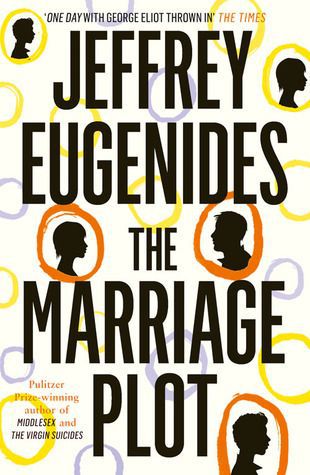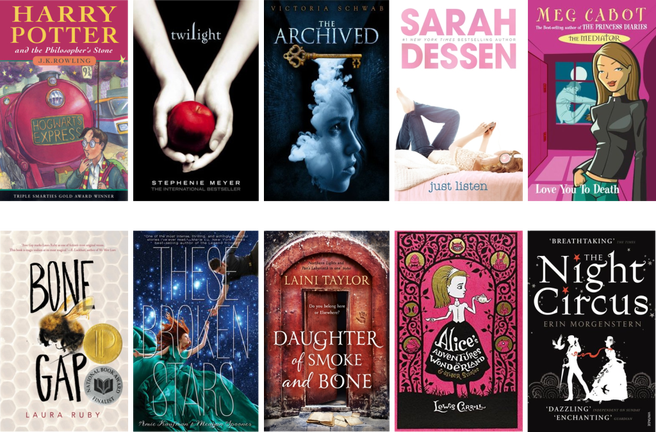
Well. Where to begin. I don’t think any book has ever taken me on a journey with as many swings between loving it and hating it. At no point did I think the book was average. It was essentially literary Marmite.
Jeffrey Eugenides has taken it upon himself to rewrite the marriage plot, and thus where the book starts is with Madeline Hanna, a soon to be graduated English Literature major. There are 2 men in Madeline’s life; Leo a brilliant scientist who suffers from Bipolar disorder, and Mitchell, a theology major whose obsession with religion dominates his life. Mitchell has been in love with Madeline since he first met her, Madeline is in love with Leo, and Leo’s love for Madeline seems highly dependent on the state of his mental health.
The first main thing I would say is you can tell the book has been written by a man. The dialogue is always in 3rd person, although is written from the point of view of Madeline, Leo or Mitchell. Eugenides masterfully carries all 3 unique voices throughout the book, however the overarching misogyny continues throughout, and I think this is where the narrative and I came to mental blows.
Mitchell is highly obsessive. His love for Madeline and his passion for religion are so intense they border on toxic, occasionally leaping a good mile into toxic territory. The language used in Mitchell’s internal monologue is scarily sexually aggressive! Set in the 1980s, far before the term friendzoned came into common use, Mitchell displays all the signs of the butt-hurt white man, who is so determined to make Madeline his he forgets she is her own person. He has decided in his mind that he will marry Madeline, and he doesn’t seem to care that she has made it quite obvious that she has absolutely no interest in him in that way. That is what makes his head such a disturbing, terrifying place to be.
The privileged white male with a bruised ego is a dangerous beast. The number of women sent to an early grave by men who couldn’t stand their sexual prowess or self image being called into question is staggering. As a young female, the idea that any man has an internal monologue similar to Mitchell’s is disturbing, and reading other reviews put forward by male critics, their refusal to separate themselves from this, or even simply acknowledge this seems to be indicative of the institutionalised male entitlement that is rife in our society.
Leo’s voice is calmer, and mainly deals with his struggles with mental health, and balancing his swings between mania and depression with his love and work life. Eugenides is masterful in his ability to portray and describe the daily life of a manic depressive, against the backdrop of the ’80s, where the stigma surrounding mental health was even greater than it is today.
Everything else I have to say about the book contains spoilers, so if you haven’t read the book stop now, below the asterixes lie spoilers, and you continue at your peril, so here’s my mini conclusion!
Overall I didn’t like the book, personally it rubbed me the wrong way. It is entirely possible that was what Eugenides was aiming to do! I would however encourage you to read it, and I would be interested to hear what you thought of it, maybe I’m becoming too feminist if such a thing exists, or being hyper-sensitive! Either way, leave a comment, or drop me a message!
SPOILERS AHEAD
**********************
So, if you’re here, you’ve either read the book already, or you’re not planning to read the book at all and subsequently don’t mind finding out the ending.
There’s one scene that made my blood boil. It isn’t even a whole dialogue, or theme, it’s less than 10 words, but it makes me doubt Eugenides supposed feminism. When Leonard has stopped taking his lithium and he starts becoming manic, Madeline describes the return of his ability to perform in the bedroom and the dramatic increase in love making. Madeline describes an occassion when Leo is trying something new, and she starts begging him to stop. He doesn’t. Eugenides goes on to applaud Leo for this, claiming it satisfied her as she’d never been satisfied before.
I don’t know what Eugenides describes as consent, but here, his understanding of it is severely at a loss. This is not a sexy moment, this is not Leo knowing Madeline’s body better than she herself knows it, as she uses for her justification, it is rape. Clear and simple. Consent was withdrawn, the act was no longer voluntary, it was rape. And Eugenides glorifies this, puts in on a mental pedestal, and this is not acceptable. It’s not a literary device, nowhere is it even hinted that either he, or Leo believes this was assault. It is portrayed normal, and it is clearly a male view of what a woman should think, not what is actually felt.
Over the course of the past few months, a devastatingly large number of women have come forward to share their experiences of sexual assault, both by celebrities and other members of the public, and for once society seems to be on their side. We have come leaps and bounds since the ’80s at tackling sexual assault, and perhaps this is a vivid example of how views have changed, but as a 2017 reader it made for uncomfortable reading.
Advertisements Share this:




